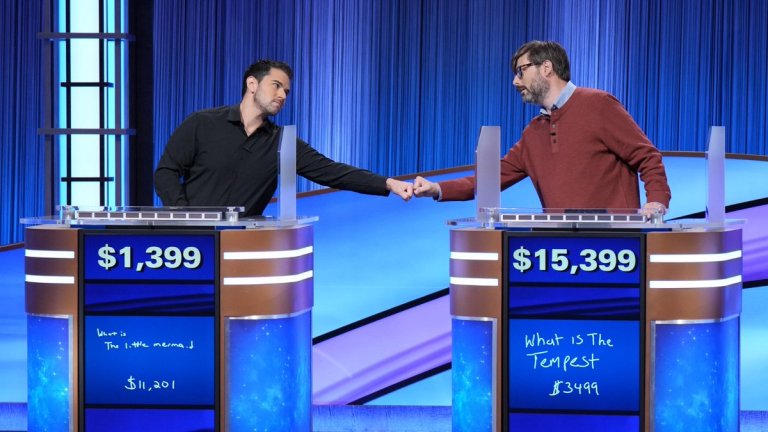Jeopardy!: How Do Contestants Study?
Just because Jeopardy! is full of seemingly random trivia questions doesn't mean that contestants can't prepare.

By its very nature, trivia is somewhat random. What amounts to a trivial bit of knowledge could mean everything from the name of the third actor to play James Bond (George Lazenby, by the way) to the first five digits of pi after the widely known 3.14 (15926). Engaging in trivia means engaging with a broad range of information. How then, could one possibly even begin to prepare for the ultimate trivia contest?
Such is the struggle that contestants on the beloved American quiz show institution Jeopardy! constantly face. Ever since it premiered more than 58 years ago, Jeopardy! is the premier game show for nerds around the country. The syndicated program, hosted by the legendary Alex Trebek for much of its run, is a grueling crucible of question after question – 61 of them in fact – that are divided into different, seemingly random, categories from episode to episode.
Preparing for such an experience seems like it would be an impossible task. But over the years, a passionate community of Jeopardy! enthusiasts, including the producers of Jeopardy! themselves, have found some ways to prep contestants for the trivia experience of a lifetime. Many Jeopardy! contestants do study for the show. And here is how they usually go about it.
How Jeopardy! Contestants Study
While Jeopardy! presents a very broad base of questions (or “answers” in the show’s parlance), the selection of those questions can never be truly random. That’s because Jeopardy! questions are written by a team of writers and not a supercomputer. And as is the case with anything involving human influence, certain biases, patterns, and preferences often sneak their way into the final product.
Anyone who has watched Jeopardy! long enough could tell you that some answers occur more frequently than others. For instance, something I’ve noticed that I’ll now share with the class is that when Jeopardy! asks a question about a Roman Emperor, the answer is “Nero” more often than not. In fact, Nero made an appearance as an answer recently in the Dec. 6 episode where Jeopardy! superchamp Cris Pannullo was unseated.
If viewers on their couch like me can pick up on a Jeopardy! answer trend, then so can the experts who try out for the show. When Jeopardy! GOAT contestant Brad Rutter spoke to Den of Geek about his game show experience, he mentioned that wise contestants know there are certain topics that are more likely to come up than others.
“They can conceivably ask you about anything, but you know that presidents are going to come up a lot, Shakespeare is going to come up a lot, world capitals are going to come up a lot. So I generally try to stay in shape with that type of stuff,” Rutter said.
Presidents, Shakespeare, and world capitals do indeed come up quite a bit. According to the site Trivia Bliss, Jeopardy! has many other topics it likes to repeat as well. These include: American History, Word Origins, Sports, 4-Letter Words, and several more.
With that knowledge in mind, studying for Jeopardy! becomes a much less intimidating proposition. Preparing doesn’t mean studying for every possible subject in the world but rather identifying some common topics, discerning which ones are your personal weaknesses, and then fine-tuning those.
In an interview with Vulture, Jeopardy! superchamp Matt Amodio revealed that he prepared for the show using this strategy. He knew that his strengths lied in categories like history, geography, literature, and classical music but that his weaknesses included modern pop culture. So he prepped accordingly.
“Thankfully, if there’s one thing the internet has information on, it’s celebrities,” Amodio said. “That’s pretty easy. I did my best to be interested in the minutiae of the celebrity eye. I’m naturally a curious person, which helps, but I still went in very skeptical. This is gonna be miserable every second I spend on TMZ reading about these people. But as I learned more, I was able to appreciate the nuances of things and started asking questions. I would read about Brad Pitt and how he was married to Jennifer Aniston before Angelina Jolie. How did that end? Well, that was an interesting outcome. I found myself interested in the answers to these questions more than I thought I would be. I went down Wikipedia pages for a lot of awards shows and then went down the rabbit holes of links.”
Identifying Jeopardy! trends and personal knowledge deficiencies is one surefire way to go about preparing for Jeopardy! but once a potential contestant has done that, there is another way to get some easy practice reps in. And that’s through a whole host of Jeopardy! practice tests available from a variety of sources. Sites like Buzzfeed and J Study Guide have a repository of Jeopardy! questions but after that one can even tackle the practice tests available on the Jeopardy! website itself. The nice thing about the official Jeopardy! test is that if you perform well enough on it (J Study Guide estimates getting at least 35 out of 50 questions right), you might enter into the actual Jeopardy! contestant pool and get a call one day.
And if that day should ever come, remember the lessons that your elders have taught you. How do you get to Sony Pictures Studios in Culver City? Practice, practice, practice.
